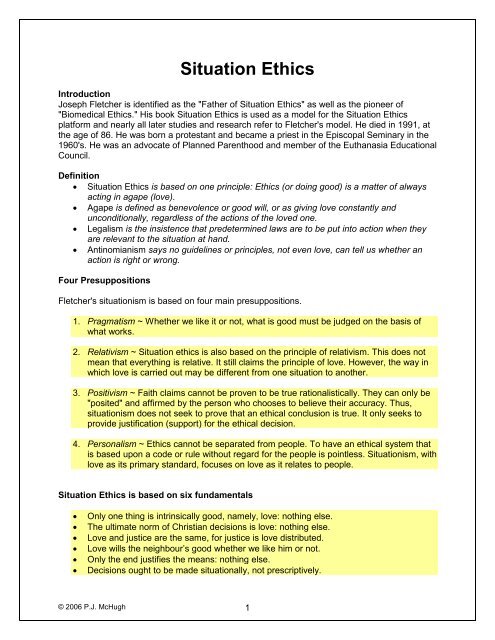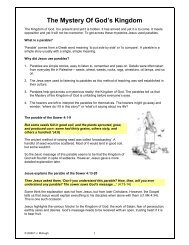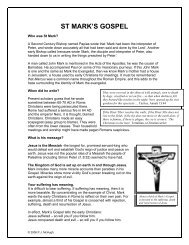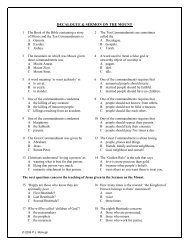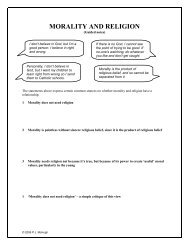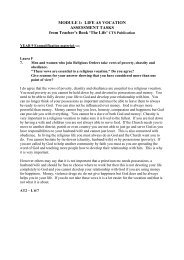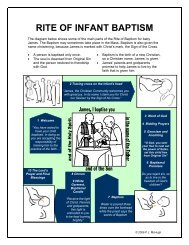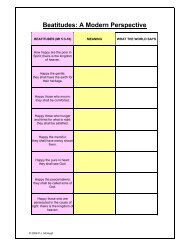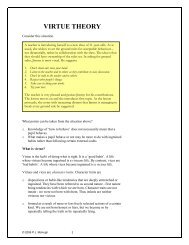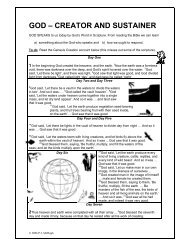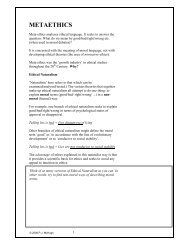Situation Ethics - TERE
Situation Ethics - TERE
Situation Ethics - TERE
You also want an ePaper? Increase the reach of your titles
YUMPU automatically turns print PDFs into web optimized ePapers that Google loves.
<strong>Situation</strong> <strong>Ethics</strong><br />
Introduction<br />
Joseph Fletcher is identified as the "Father of <strong>Situation</strong> <strong>Ethics</strong>" as well as the pioneer of<br />
"Biomedical <strong>Ethics</strong>." His book <strong>Situation</strong> <strong>Ethics</strong> is used as a model for the <strong>Situation</strong> <strong>Ethics</strong><br />
platform and nearly all later studies and research refer to Fletcher's model. He died in 1991, at<br />
the age of 86. He was born a protestant and became a priest in the Episcopal Seminary in the<br />
1960's. He was an advocate of Planned Parenthood and member of the Euthanasia Educational<br />
Council.<br />
Definition<br />
• <strong>Situation</strong> <strong>Ethics</strong> is based on one principle: <strong>Ethics</strong> (or doing good) is a matter of always<br />
acting in agape (love).<br />
• Agape is defined as benevolence or good will, or as giving love constantly and<br />
unconditionally, regardless of the actions of the loved one.<br />
• Legalism is the insistence that predetermined laws are to be put into action when they<br />
are relevant to the situation at hand.<br />
• Antinomianism says no guidelines or principles, not even love, can tell us whether an<br />
action is right or wrong.<br />
Four Presuppositions<br />
Fletcher's situationism is based on four main presuppositions.<br />
1. Pragmatism ~ Whether we like it or not, what is good must be judged on the basis of<br />
what works.<br />
2. Relativism ~ <strong>Situation</strong> ethics is also based on the principle of relativism. This does not<br />
mean that everything is relative. It still claims the principle of love. However, the way in<br />
which love is carried out may be different from one situation to another.<br />
3. Positivism ~ Faith claims cannot be proven to be true rationalistically. They can only be<br />
"posited" and affirmed by the person who chooses to believe their accuracy. Thus,<br />
situationism does not seek to prove that an ethical conclusion is true. It only seeks to<br />
provide justification (support) for the ethical decision.<br />
4. Personalism ~ <strong>Ethics</strong> cannot be separated from people. To have an ethical system that<br />
is based upon a code or rule without regard for the people is pointless. <strong>Situation</strong>ism, with<br />
love as its primary standard, focuses on love as it relates to people.<br />
<strong>Situation</strong> <strong>Ethics</strong> is based on six fundamentals<br />
• Only one thing is intrinsically good, namely, love: nothing else.<br />
• The ultimate norm of Christian decisions is love: nothing else.<br />
• Love and justice are the same, for justice is love distributed.<br />
• Love wills the neighbour’s good whether we like him or not.<br />
• Only the end justifies the means: nothing else.<br />
• Decisions ought to be made situationally, not prescriptively.<br />
© 2006 P.J. McHugh 1
Applications of <strong>Situation</strong> <strong>Ethics</strong><br />
These are some of the examples often used in discussions about <strong>Situation</strong> <strong>Ethics</strong>.<br />
1 As the Russian armies drove westward to meet the American and British armies, a Soviet<br />
patrol picked up a Mrs. Bergmeier scavenging food for her three children. Unable to get<br />
word to the children, she was taken to a prison camp in the Ukraine. Her husband had been<br />
captured in the Bulge and taken to a POW camp. When he was returned to Berlin, he spent<br />
weeks rounding up his children. Their mother's whereabouts remained a mystery.<br />
Meanwhile, Mrs. Bergmeier learned through a sympathetic commandant that her husband<br />
and family were trying to keep together and find her. But the rules allowed them to release<br />
her for only two reasons: 1.) Illness needing medical facilities beyond the camps in which<br />
case she would be sent to a Soviet hospital, and 2.) Pregnancy, in which case she would be<br />
sent back to Germany. She turned things over in her mind and finally asked a German camp<br />
guard to impregnate her, which he did. She was subsequently sent back to Berlin and to her<br />
family. They welcomed her with open arms, even when she told them how she had<br />
managed it. When the child was born, they loved him more than the rest, on the view that<br />
the child had done more for them than anybody had.<br />
2 In the 18th century along the Boone Trail, the following two scenarios took place:<br />
a) A Scottish woman saw that her suckling baby, ill, and crying, was betraying her and her<br />
other three children, and the whole company to the Indians. But she clung to her child,<br />
and they were caught and killed.<br />
b) A Negro woman, seeing how her crying baby endangered another trail party, killed it with<br />
her own hands, to keep silence and reach the fort.<br />
Which woman made the right decision?<br />
3 A Romanian Jewish woman doctor aborted the pregnancies of 3000 Jewish women brought<br />
to the concentration camp. If they were found to be pregnant, they would be incinerated.<br />
Even if we believe that the human embryos are human lives, by "killing" 3000 the doctor<br />
saved 3000 and prevented the murder of 6000 in total. Is this not good?<br />
Comment<br />
At first glance, these examples seem to validate <strong>Situation</strong> <strong>Ethics</strong> as a theory, since each seems<br />
to demand, literally, a situation ethic – a principle of action (ethic) driven by the judgement of the<br />
person caught up in the situation. However, it was always recognised in Natural Law <strong>Ethics</strong> that<br />
it is one thing to have principles of action, another to apply them. In difficult or dilemma<br />
situations (like the ones above), a person has to fall back on very basic principles (e.g. ‘do good,<br />
avoid evil’) and apply them as best the person could. Has Fletcher really said anything new?<br />
And is the concentration on dilemma or near-dilemma situations really that instructive for the<br />
student of ethics? See criticisms below.<br />
© 2006 P.J. McHugh 2
Critique of <strong>Situation</strong> <strong>Ethics</strong><br />
Positive<br />
1 It can be considered as the solution to<br />
two tendencies in ethics – rule-bound<br />
ethics (legalism) and no-rules ethics<br />
(antinomianism). It has one rule: love.<br />
The rule of love is prescriptive, others<br />
rules merely illuminative.<br />
2 It is simple and yet profound. It is not<br />
meant to encourage laxity. Fletcher<br />
has in mind agape, that self-giving,<br />
unconditional willing of another’s good,<br />
when he uses the word love.<br />
3 In grounding his theory in this love<br />
Fletcher seeks to align it with the<br />
gospels and the letters of Paul (cf.<br />
Great Commandment & St Paul’s<br />
hymn to agape in 1 Corinthians).<br />
4 It aims to skirt the problems arising<br />
when a situation brings important rules<br />
into conflict. It simply says: ‘Do the<br />
most loving thing.’ Fletcher, is in book<br />
<strong>Situation</strong> <strong>Ethics</strong>, highlights cases when<br />
the application of rules in itself does<br />
not address the moral problem.<br />
Negative<br />
Fletcher’s theory will share the weaknesses of<br />
utilitarianism, of which it appears to be a form.<br />
1 Fletcher’s theory depends on the<br />
individual’s appraisal of situations. A<br />
person, even with the finest of<br />
intentions, cannot foresee every<br />
consequence of an action, nor realise<br />
the number likely to be affected by it.<br />
2 Add to this the taint on a person’s<br />
decision-making arising from ingrained<br />
self-seeking and from a reluctance to<br />
aim for the high standards of<br />
unconditional love, and we quickly see<br />
the value of a more rule-dependent<br />
moral system - if only to protect others<br />
© 2006 P.J. McHugh 3<br />
from our latent selfishness<br />
masquerading as ‘love’.<br />
3 St Paul wrote not that ‘love is the end<br />
of the law’ but that ‘love is the<br />
fulfilment of the law’. For love and law<br />
need each other. Love needs law for<br />
its direction, while law needs love for<br />
its inspiration. (cf. John Stott)<br />
4 Add to this the impracticality of<br />
attempting a moral calculus when a<br />
quick decision is needed.<br />
5 Fletcher’s ethics stresses the<br />
uniqueness of moral situations. Whilst<br />
no two situations demanding moral<br />
choices can be said to be identical, the<br />
moral problem may be so similar in<br />
each as not to require separate<br />
analysis. In other words, situations<br />
that vary enormously in externals<br />
may be very similar in their moral<br />
tenor.<br />
5 It could be argued that when one acts<br />
lovingly there are certain things one<br />
will always do and certain things one<br />
will never do. Fundamental rules, like<br />
those in the Decalogue, are merely<br />
‘crystallisations of love’.<br />
6 Hence, the rule of love is interpreted<br />
through other rules which should also<br />
be prescriptive. Certainly, the Judeo-<br />
Christian heritage is one wherein rules<br />
have a place - even in the agape<br />
communities of the early Church.<br />
6 The problem of legalism is not brought<br />
on by rules, but by a mindset.<br />
Legalistic minds may abound even<br />
when there are few explicit rules, and<br />
those who are not of a legalistic<br />
mindset will ignore the fussier,<br />
pernickety prescriptions of an<br />
elaborate rule system - they will realise<br />
that certain prescriptions are more<br />
binding than others.


